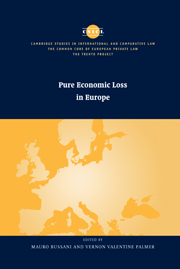Book contents
- Frontmatter
- Contents
- General editors' preface
- Preface
- List of contributors
- Table of legislation
- Relevant statutory and codified provisions (in translation)
- List of abbreviations
- Part I Situating the Frontier
- 1 The notion of pure economic loss and its setting
- 2 The rule against recovery in negligence for pure economic loss: an historical accident?
- 3A Pure economic loss: an economic analysis
- 3B Liability for pure financial loss: revisiting the economic foundations of a legal doctrine
- 4 American tort law and the (supposed) economic loss rule
- 5 The liability regimes of Europe – their façades and interiors
- Part II The comparative evidence: case responses and editors' comparative comments
- Part III Much ado about something
- Bibliography
- Index
3B - Liability for pure financial loss: revisiting the economic foundations of a legal doctrine
Published online by Cambridge University Press: 03 November 2009
- Frontmatter
- Contents
- General editors' preface
- Preface
- List of contributors
- Table of legislation
- Relevant statutory and codified provisions (in translation)
- List of abbreviations
- Part I Situating the Frontier
- 1 The notion of pure economic loss and its setting
- 2 The rule against recovery in negligence for pure economic loss: an historical accident?
- 3A Pure economic loss: an economic analysis
- 3B Liability for pure financial loss: revisiting the economic foundations of a legal doctrine
- 4 American tort law and the (supposed) economic loss rule
- 5 The liability regimes of Europe – their façades and interiors
- Part II The comparative evidence: case responses and editors' comparative comments
- Part III Much ado about something
- Bibliography
- Index
Summary
As generally understood in the law and economics literature, the economic loss rule states that a plaintiff cannot recover damages for a pure financial loss. The comparative study of the pure economic loss rule reveals that the recognition and significance attributed to such rule, and to the notion of ‘economic loss’, varies considerably across Western legal systems. Bussani and Palmer analyse the results of an extensive case study on the issue of pure economic loss across all national legal systems of Europe and provide an interesting grouping of the approaches followed by national courts of Europe, describing them variously as ‘liberal’, ‘pragmatic’ or ‘conservative’. The question has emerged in the European context in conjunction with the ongoing search for a common core of European private law and the consideration of a unified European civil code. Comparative legal analysis reveals that the policies and rules governing tortious liability for pure economic loss in Europe are not governed by common principles.
Legal systems simply do not share a common approach to this issue. Even those that seek to preclude recoverability of pure financial loss use different definitions and follow different formulations of the problem. An interesting point recently brought to light by comparative legal analysis is that, unlike most other issues in the field of torts, the different approaches on the issue of pure economic loss do not follow the familiar common law/civil law divide.
- Type
- Chapter
- Information
- Pure Economic Loss in Europe , pp. 75 - 93Publisher: Cambridge University PressPrint publication year: 2003
- 7
- Cited by



